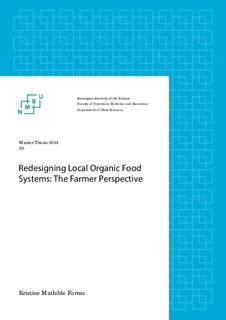Redesigning local organic food systems : the farmer perspective
Master thesis
Permanent lenke
http://hdl.handle.net/11250/198943Utgivelsesdato
2014-07-30Metadata
Vis full innførselSamlinger
- Master's theses (IPV) [240]
Sammendrag
The growth of localized food systems and alternative food networks reconnects farmers and consumers, and contributes to resilience and sustainability of food systems. Local food systems bring life to rural areas and favor community building, supporting local economies and local ecosystems. Community supported agriculture (CSA) has grown rapidly in the last decades, and builds on the notion of shared risks and costs of food production, by allowing for shareholder contribution and joint learning about food. This study contributes to the discussion about farmer transitions towards CSA by discussing shared characteristics, as well as forces that support and hinder the process. Qualitative semi-structured interviews were carried out with six Norwegian CSAs. Findings revealed that there emerged two main reasons for CSA establishment. One, being in an unwanted situation with vegetable wholesalers, declining income and demand. Two, the desire to connect with consumers and see opportunities to locally produce organic food with increased involvement from the local community. The CSA farmers show a high motivation for producing quality food produced on farm resources while demonstrating environmental engagement and emphasizing sustainable use of resources. Location and organizational form is found to be an important factor for commitment and engagement from shareholders. The network of CSA is a supportive force of collaboration and knowledge-exchange in order to develop new and existing CSAs. CSAs are found to be a viable option for farmers to increase social relationships, foster learning, and improve the economic stability of the farm. CSA is likely to remain a small, but important, part of food systems, and is seen as an essential component in re-localizing food systems.
